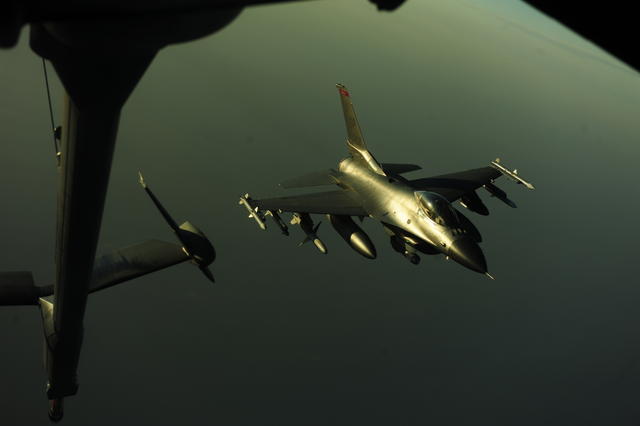
A KC-10 tanker prepares to refuel an F-16 ready to fly into Libyan airspace / Air Force photo by Tyler Placie
Muammar Gaddafi is falling as Libya’s leader after 42 years because of sharpening NATO air strikes, allied intelligence shared with the rebels, the rebels’ own improved military tactics, and the simple passage of time. Additional allied assistance — consisting of training and equipping the rebel forces – also has helped speed up the outcome, U.S. military officials say. The knockout punch came from the west, led by Berber guerrillas from the Nafusa Mountains along the Libyan-Tunisian frontier. Gaddafi’s forces — after months of fighting rebels in the eastern part of the country — plainly didn’t have the military might to wage a campaign on two fronts.
Once the rebels began moving towards Tripoli from the west, Gaddafi’s forces couldn’t mass to repel their advance without being attacked by NATO airpower. Just as such firepower forced Gaddafi to give up his fight for Benghazi — his pledge to hunt down and kill his opponents there triggered the air war late last winter — so too did it leave his western flank exposed. Britain and France dispatched a significant amount of low-tech weapons — including rocket-propelled grenades and machine guns — to the beleaguered rebel forces in past weeks, U.S. officials said.
Tripoli exploded from the inside as much as from without. Rebel forces salted arms inside the capital and passed word that they’d be used to seize streets and battle loyalist forces on Saturday. NATO and the Pentagon “have been for some time closely coordinating with the TNC in this effort,” White House spokesman Josh Earnest said Monday, referring to the Libyan rebels’ Transitional National Council, which the U.S. government recognized as Libya’s legitimate government July 15.
Paul Hughes, a retired U.S. Army colonel now with the Center for Conflict Analysis and Prevention at the U.S. Institute of Peace, believes allied weapons and training — and, most critically, intelligence — played major roles in the rebels’ push into the capital. Surveillance imagery, largely from the British and French, was shared with the rebels, U.S. officials said. “The intelligence helped them avoid roadblocks and bypass Gaddafi’s forces,” Hughes says. “The way that the rebels out-maneuvered the Libyan government forces is remarkable because that tells me they had better intelligence.”
Firepower from the sky was the key enabler. “Airpower reduced the Libyan army to dismounted infantry,” says retired U.S. Air Force lieutenant general Dave Deptula, who ran the 1991 air war over Iraq and the 2001 campaign over Afghanistan. “Over time, the Libyan forces got to the point where they just simply can’t operate effectively anymore, and that’s what has given the rebels the advantage to advance into Tripoli.”
It’s all over but the shooting. “The Gaddafi family rule effectively has ended,” veteran DIA analyst John McCreary declared on his private NightWatch blog early Monday. “When Gaddafi is finally ousted or flees, Libya could become the first Arab state to experience a genuine, fundamental change of government, in other words, a revolution, in 2011.”
But Anthony Cordesman, a military expert at the Center for Strategic and International Studies, doubts Libya will flower as a democracy any time soon. “Democracy is a form of government and not a form of magic,” he said in a report on Libya post-Gaddafi. “What we call democracy in the US works because the gaps in wealth are acceptable, because government functions reasonably well, because we have stable and experienced political parties, a separation of powers, and checks and balances that rely on a Supreme Court as well as legislative and Presidential elections, a functional constitution, and a rule of law that limits the role of our police and security forces and protects human rights. None of these things exist in Libya…”
McCreary noted that the rebels who first entered Tripoli are likely from a different tribe than those from Benghazi, suggesting their goals, and how to achieve them, may differ. “They appear to have come from the western forces that took Zawiya and which received a large arms supply from France recently,” he noted. “The ability of the Benghazi leadership to restore order and take charge in Tripoli under some kind of arrangement with the western rebels and the willingness of the western rebels to accept Benghazi’s leaders will be strong indicators of the durability of the rebel coalition. Prospects are doubtful.”
The campaign took as long as it did because even precision-guided munitions come only within 10 feet of their target. “If you’re looking at mass in terms of what an army consists of, you can hit a lot of targets with a 10-foot error probability for a long period of time,” Deptula says. “The key isn’t attrition of every force — the key is hitting critical targets that cause his army to fall into dysfunction, so they can’t communicate with one another, the leadership can’t communicate with the forces, they can’t fly their aircraft, and they can’t use their surface-to-air missiles.”
Hughes maintains the U.S. needs to address just how and why it gets involved in such conflicts before another one looms. “It was clearly evident we were going to be taking sides,” Hughes says. “War makes winners and losers, and for us to go in saying we’d stay neutral — that was a fig leaf that feel off almost as soon as it was announced.”
The U.S. isn’t planning on dispatching ground forces to Libya to quell any unrest. “If there is going to be some kind of transitional mission that involves any kind of foreign troops,” Marine Colonel Dave Lapan, a Pentagon spokesman, said, “there wouldn’t be U.S. ground troops as part of that.” But the U.S. may provide cargo planes to fly in humanitarian aid in the coming days.


